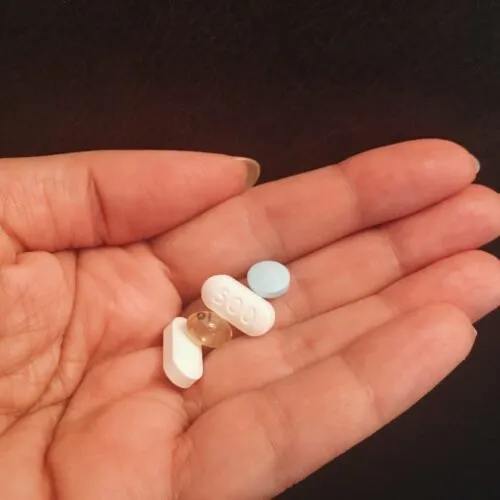The movements of everyday life can cause wear and tear of the joints resulting in weakness, inflammation, and pain. If you are experiencing joint pain or are active and just want to keep your joints strong and prevent injury, taking the best supplements can help.
Supplements may help build your joints back up, improve lubrication, and decrease inflammation. But not all supplements labeled to help osteoarthritis or joint health are created equally. They often have only one active ingredient, use forms that the body can not readily use, and have harmful fillers. In the case of additives and fillers you could actually be causing more harm than good.
Knowing which supplement ingredients are the most effective can help make a more informed decision as you work to improve your joint health. Check products for the following researched ingredients . . .
1. Omega 3 Fatty Acids
The most researched supplement for joint health is omega 3 fatty acids. They have been found in some studies to be as effective as over the counter anti inflammatory medications. Omega-3s show good evidence in improving symptoms in both rheumatoid and osteoarthritis including morning stiffness and joint tenderness.
Omega 3 supplements are an oil and can go rancid very quickly. To get the benefits without the harmful toxins, I recommend buying this direct from a distributor instead of big box store where you don’t know how long they have sat on a shelf.
2. Glucosamine Sulfate
One of the most well known joint supplements is glucosamine. It has been shown to lessen arthritis pain and increase joint lubrication because glucosamine sulfate is a naturally occurring amino acid that’s needed to make glycosaminoglycan which repairs and strengthens cartilage (the material damaged in arthritic joints).
Many supplements use a cheap and less effective form called glucosamine hydrochloride. Be sure your supplement used the scientifically research sulfate form. In addition, most brands pair glucosamine with chondroitin – which could potentially improve joint health as well – but the two work against one another. In fact, chondroitin keeps glucosamine from being absorbed by the body. No absorption means no benefits!
3. Turmeric
A study in 2009 compared extracts of turmeric, specifically curcumin, and found that it worked as well at relieving symptoms of arthritis as taking ibuprofen daily. The benefits come from the way curcumin decreases inflammation in the body – including the joints.
Unfortunately, you are not likely to get enough curcumin from seasoning your food with the turmeric you have in your pantry. For these reasons, the Arthritis Foundation recommends taking this in supplement form.
4. Boswellia
I much less discussed but also evidenced based supplement for arthritis is boswellia or “Indian frankincense”. It is an ayurvedic herb used for its anti inflammatory and analgesic (pain relieving) effects.
In one study, although the sample size was small, osteoarthritis patients given boswellia all reported a decrease in knee pain, increased knee flexion, increased walking distance, and a decrease in joint swelling..
5. Ginger
This herb is anti-inflammatory as well, but is more well known for its stomach-settling properties. Ginger has been used in Chinese, Japanese, and Indian medicine for hundreds of years and claims to decreases arthritis joint pain and inflammation.
There is little scientific research directly on the effects of ginger on arthritis, but studies do show ginger acts an an anti-inflammatory in the body. Since arthritis causes significant inflammation in and around the joints, we could conclude that decreasing this inflammation with a herb such as ginger would decrease symptoms. .
6. Bromelain:
This is an enzyme found in pineapples and is another natural anti-inflammatory. Actually eating pineapple may benefit some, but it is unknown if the amount found in a serving of pineapple would have the same anti inflammatory effects as is in the research.
One study showed a combination of enzymes including bromelain to be a safe alternative to anti-inflammatory drugs for people with knee osteoarthritis. There are no known side effects to consuming this enzyme as there are with prescription drugs.
Although some people notice improvements immediately, most of the studies I have seen indicate it may take three months or more of taking a supplement to see the improvements you are looking for. This is probably the biggest mistake I see clients make when it comes to joint health supplementation. People with often purchase a one month supply and quit taking it when they don’t see dramatic results.
Remember, supplements don’t work like a prescribed pain killer. But also remember that pain killer only lasts 4-6 hours, where the benefits of improved joint health through supplementation will demonstrate health improvements 24/7.
Second mistake I see clients make – not reading the labels. Many brands add artificial fillers to cut cost to offer cheap products. These might include artificial colors, GMOs, gluten, soy products, or other additives that can cause more harm than good in your body.
How do you find the joint health supplement that is free of additives and right for you?
Remember that all supplements are not safe for everyone and just because it helped a friend does not mean it is right for you. Let me help you set up a safe and effective plan personalized to you absolutely free. Just e-mail me amanda@peakpotentialpt.com and put “joint supplements” in the subject line.
Want to get started now with a general formula to support your bones and joints, click the link below for the product we trust, use, and recommend.


